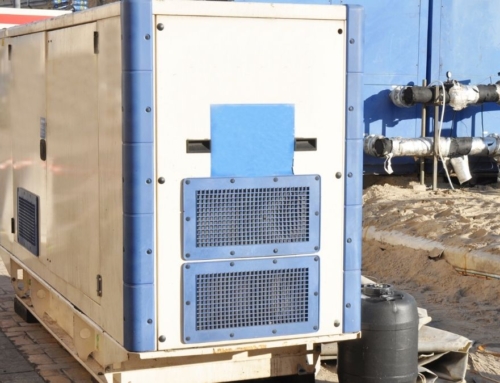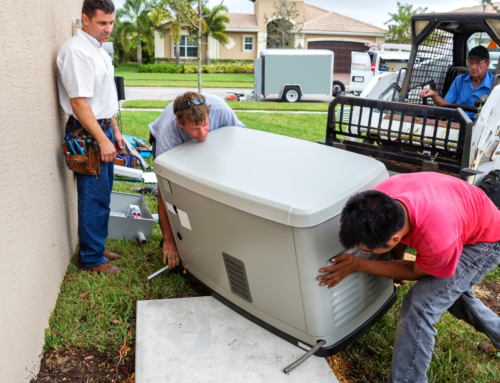Backup commercial generators are very essential for airports as they ensure the continuous operation of essential systems during power outages that occur in severe weather conditions and other emergencies. You can experience a reliable power supply for critical operations like lighting, communication, baggage handling, safety maintenance, and disruptive prevention.
In this blog, let’s discuss why backup generators are important for airports, the types of backup generators available for airports, and the features of airport backup generators.
Why are backup generators important for airports?
Below are some of the reasons why backup generators are important for airports:
Maintain Essential Operations
Airports rely on consistent power supply for different functions and during outages, the backup generators will make sure the critical systems including lighting, traffic control, and baggage handling are running without interruption.
Disruptive Prevention
Backup generators help to ensure smooth operations across the airport during sudden power outages and provide seamless passenger check-in, ticket purchase, and continued travel without any disruption.
Safety
Runway lighting, emergency lighting, and air traffic systems rely on continuous power supply, thus backup generators make sure these systems are operational during any emergency condition by contributing complete safety to the airport.
Communication Maintenance
Some of the communication systems including airport tower communication and emergency communication on flight delays and early arrival are important for efficient and safe airport operations. Backup generators make sure that these communication systems are operational during power outages.
Equipment and Infrastructure protection
Backup generators are responsible for providing a consistent power supply to protect essential equipment and systems. It also safeguards the infrastructure from malfunction or potential damage during outages.
Reduce economic impact
Power outages for prolonged periods due to grid failure or weather conditions will result in huge economic losses for the airports. The backup generators reduce losses by allowing airports to serve passengers and keep operations running.
Meet regulatory standards
Airports will have regulatory requirements for backup power systems. These requirements are met by backup generators and provide compliance.
Peace of mind
Having a backup generator will provide peace of mind to passengers and staff as all essential systems will operate continuously even during power outages or extreme weather conditions.
Types of backup generators available for airports
Airports make use of different commercial backup generators such as natural gas, diesel, and some mobile or portable backup power sources for uninterrupted operations during grid failure or power outage. These generators are important for consistent airport operations, security, and navigation systems.
Some of the backup power generators used in airports are:
Diesel generators
Diesel generators are the most preferred choice for airports because of their reliability, supporting long routines, and energy density. They are commonly used for large-scale power requirements.
Natural gas generators
Natural gas generators provide clean burning and it is suitable for airports that have natural gas pipeline connections. They simplify fuel maintenance and storage when compared with diesel generators.
Portable and mobile generators
Portable and mobile generators are less commonly used as primary power supply as it is used for backup and smaller loads in certain areas.
Standby generators
Standby generators are a crucial component of airport infrastructure that ensures essential systems operations and makes sure they remain operational during outages.
Industrial Generators
Industrial generators are commonly used in large airports to handle the power demands of various systems.
Emergency generators
These generators are specially designed to power essential equipment during emergency situations.
Standby generators
Additional standby generators may be used in airports and businesses for more comprehensive backup power. Some of the standby generators should meet regulations such as the National Fire Protection Agency or NFPA 110.
How backup commercial generators work in airports
Backup commercial generators will safeguard the airports from power outages by ensuring all critical operations continue to function even during main grid failure. They automatically switch to a backup power source, especially fuel-powered power source within a few seconds of a power outage and they return back to the main grid once the power is restored.
Here’s how the backup commercial generator works in an airport
- Detects power outage: When the power grid fails, the sensors in the generator detect the loss of power.
- Automatic Transfer Switch or ATS Activation: ATS has a special switch that automatically senses the outage and transfers the power source from the grid to the generator and vice versa when power is restored.
- Generator Startup: ATS signals the generator to start within a few seconds of power outage.
- Fuel Supply: A generator engine fueled with natural gas or diesel will start running and generate electricity.
- Power Transfer: ATS seamlessly switches back the electrical load to the generator by ensuring continuous power supply.
- Load shedding: When the generator approaches maximum generating capacity, it will automatically implement a load-shedding process that disconnects power to systems that are non-essential to avoid overloading.
- Main grid restoration: When the power grid is restored and in stable working condition, the ATS automatically switches to the primary source, and the generator gets shut down.
Some of the key features of airport backup generators:
Speed
They are very fast in providing power when there is an outage to minimize disruptions.
Capacity
Generators in airports are able to handle high power demands by providing sufficient power to all vital systems to keep them running.
Reliability
Generators for airports are very important for operational continuity and safety as they are highly reliable with regular maintenance.
Fuel Type
Diesel generators are commonly considered efficient because of their performance and fuel availability.
Load Management
Load management systems will help to balance the generator output by preventing overloading and ensuring consistent power distribution.
Critical systems
Backup generators in airports are essential for airports to keep running essential systems like runway lighting, air traffic control, security systems, baggage handling, and communications.
If you’re looking to buy a backup commercial generator for airports, contact our expert today.
CS Diesel Generators provide all kinds of new and used indoor and outdoor generators and their parts for sale. We also buy your used power generators at competitive pricing. Contact our expert today to find the right backup generator to keep the airport up and running.
FAQs about Importance of Backup Commercial Generators for Airports
Why are backup generators important for airports?
Airports rely on consistent power supply for different functions and during outages, the backup generators will make sure the critical systems including lighting, traffic control, and baggage handling are running without interruption.
What are the types of backup generators available for airports?
Some of the types of backup generators available are diesel generators, natural gas generators, portable and mobile generators, standby generators, industrial generators, emergency generators, and standby generators.





